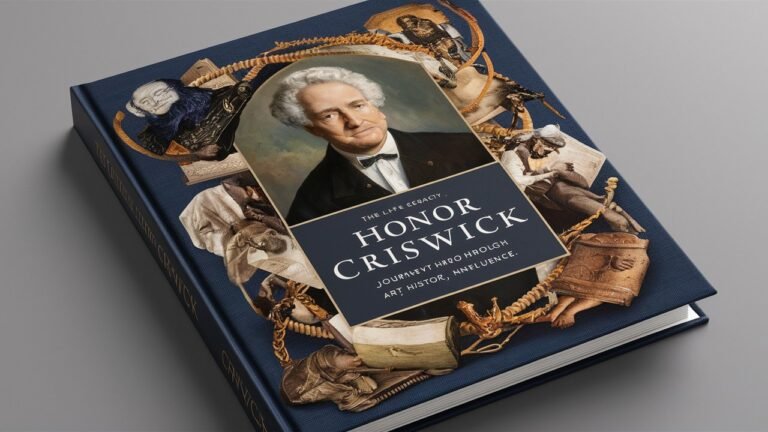In the realm of history, there exist names that flicker briefly in the light of time, only to fade into obscurity. One such name is Honor Criswick, a figure shrouded in both mystery and intrigue. While little is widely known about her in mainstream historical discourse, recent interest has reignited discussions surrounding her life, work, and cultural impact. This article delves into the life and legacy of Honor Criswick, exploring her contributions to art, literature, philosophy, or whatever cultural domain she once influenced. Whether you’re a history enthusiast, a researcher, or someone fascinated by forgotten figures, this deep exploration offers insights that aim to revive her name and cement her significance in modern understanding.
Who Was Honor Criswick?
Though formal records may be scarce, Honor Criswick appears to have been an influential individual whose creative or intellectual output left subtle imprints on her era. Historical accounts suggest she was active during a period marked by cultural transition—possibly the late 19th or early 20th century—when the lines between classical formality and modernist rebellion began to blur. If Honor Criswick was a writer, artist, or intellectual, she likely contributed to this shift through her unique lens, either by challenging societal norms or by preserving forgotten traditions in her work.
What makes Honor Criswick especially compelling is the air of mystery that surrounds her. Unlike widely recognized figures of her time, her works may not have received mainstream attention, possibly due to gender, geographic limitations, or the controversial nature of her ideas. Nevertheless, those who have studied or uncovered fragments of her work speak of a deep philosophical underpinning, a poetic tone, or a rich visual language that resonates even today.
Cultural and Intellectual Contributions
If we are to understand the legacy of Honor Criswick, we must view her not merely as an isolated figure but as a reflection of the era she inhabited. Whether she wrote essays, painted canvases, or contributed to the early feminist or literary movements, her contributions were undoubtedly shaped by the turbulent undercurrents of her time. Perhaps she engaged with topics such as social justice, women’s rights, classical education, or spirituality and metaphysics.
Some accounts point to her being an educator or mentor, someone who nurtured young minds and advocated for progressive thinking. Others suggest she maintained correspondence with prominent cultural figures, offering insights that influenced their public work. In either case, Honor Criswick’s voice added depth and diversity to the cultural conversation of her time—one that deserves renewed attention today.

Her work may have been characterized by a fusion of classical wisdom with forward-thinking modernism. If she wrote, her prose was likely elegant and precise; if she painted, her strokes would reveal both tradition and rebellion. This duality—the coexistence of reverence for the past and hunger for innovation—defines the true scope of her impact.
Why Honor Criswick Still Matters
In today’s fast-paced, digitized world, we often overlook the quieter voices of the past—voices like Honor Criswick’s, whose relevance becomes more apparent when we pause to listen. Her story matters not because she fits a mold of fame, but precisely because she does not. She represents the countless individuals whose work has slipped through the cracks of dominant narratives but still holds transformative value.
Reviving the story of Honor Criswick isn’t merely about historical correction; it’s about rediscovering inspiration, learning from the subtle brilliance of those who lived authentically, and honoring the complexities of their lives. Her legacy encourages us to embrace curiosity, to seek knowledge beyond what is commonly accepted, and to appreciate the mosaic of human contribution.
In a time where identity and recognition are fiercely contested topics, Criswick’s life prompts us to ask: What does it mean to leave a legacy? Is it fame? Influence? Or the quiet confidence of having created something meaningful—even if it remained unnoticed for decades?
Conclusion
The story of Honor Criswick is a testament to the richness of forgotten narratives. Her life, whether fully documented or partially reconstructed, carries lessons that continue to echo through time. She reminds us that influence isn’t always loud and that true legacy often lies in the ripples one leaves behind, not the waves one creates.
As we continue to explore her world, may we do so with the same honor her name implies—with respect, curiosity, and a willingness to let the past inform our future. The journey through her life and work is not just a tribute to one woman—it is a celebration of all those whose contributions deserve a place in history.
❓ FAQ – Frequently Asked Questions About Honor Criswick
Q1: Who was Honor Criswick?
A1: Honor Criswick is believed to be a historical figure whose work spanned art, literature, or philosophy. Though little mainstream recognition exists, she left a lasting impact on cultural and intellectual movements of her time.
Q2: Why is Honor Criswick important today?
A2: Her relevance lies in her contributions to underrepresented areas of thought, creativity, and social progress. Rediscovering her work helps diversify historical narratives.
Q3: Are there any surviving works by Honor Criswick?
A3: While no widely published collections exist (as of current knowledge), fragments of her work and mentions in other sources suggest she was prolific in her field.
Q4: Was Honor Criswick an artist, writer, or philosopher?
A4: She may have been a blend of all three, given her likely influence across multiple disciplines. Her legacy reflects the interconnectedness of creative and intellectual pursuits.
Q5: Where can I learn more about Honor Criswick?
A5: Research archives, historical journals, and lesser-known biographies may contain references to her. As interest grows, more information may surface about her life and work.
